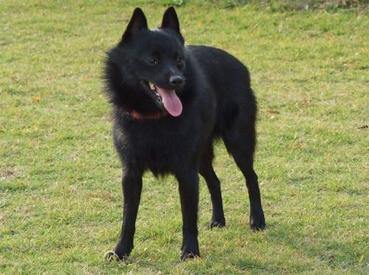
Despite many believing the Schipperke, meaning 'little boatman,' descends from the Spitz family, this is not the case. The Schipperke in fact derives from the 17th century Leauvenaar black shepherd dog, which is also the original forebear of the Groenendael Belgian Sheepdog. Developed in Flanders by Renssens, a canal boat captain who wanted a guard and companion dog to accompany him on his barge, the Schipperke has been progressively bred down in size, and appears now as a miniature toy breed. Exported throughout the world after its first appearance at a dog show in 1880, the breed was highly prized as a bold and willing companion dog amongst artisans and fanciers. During WWI, the Schipperke was widely enlisted as messenger dogs by the Belgian Resistance. It was recognised by the American Kennel Club in 1904.
Sometimes referred to as the 'little black fox' or the 'little black devil,' the Schipperke is distinctive in appearance and structure. Boasting short limbs, a stocky frame, a wedge-shaped head with a defined muzzle, and high-set, triangular ears. The coat is profuse and coloured black or blonde, however the latter is less frequently seen. Despite being an illegal practice across Europe, tail 'docking' is often observed in the breed, although most Schipperkes are born without a tail altogether; this is rumoured to have happened when a shoemaker, enraged by the behaviour of his neighbour's dog, decided to cut off its tail.
Generally speaking, the Schipperke is a highly energetic and inquisitive breed that benefits from both physical and mental stimulation, regular human companionship and firm but fair leadership in order to achieve its pleasing potential. It is common for a Schipperke to display 'Small Dog Syndrome,' including behaviours of stubbornness, dominance and aggression. To curb these behaviours, consistent training and early socialisation is imperative. Otherwise, the Schipperke is gentle, loyal and affectionate and will complement any home setting. A healthy Schipperke at full maturity will weigh 4-9 kg depending on its gender, with a life expectancy of 15 years. It is not uncommon for the breed to outlive this expectancy.
The Schipperke is typically healthy, although various afflictions are identified in the breed. These range from orthopedic complaints to optical disorders, as well as epilepsy. Prone to easy weight gain, Schipperkes should not be fed human foods.
Do you own a Schipperke? Let others know what they're like!
Related products
Advantage 80 Spot On Flea Control Large Cats and Rabbits
from £12.95
Advantage 40 Spot On Flea Control Cats, Small Dogs and Rabbits
from £12.95
Advantage 250 Spot On Flea Control Large Dog
from £12.95
Advantage 100 Spot On Flea Control Medium Dog
from £12.95
Drontal Tasty Bone Wormer Tablets for Small & Medium Dogs (2 to 20kg)
from £2.15
TermaWorm™ Tablets for Cats & Dogs
from £1.79
Drontal Tasty Bone XL Wormer Tablets for Large Dogs (Over 20kg)
from £6.39
Advantage 400 Spot On Flea Control Extra Large Dog
from £12.95